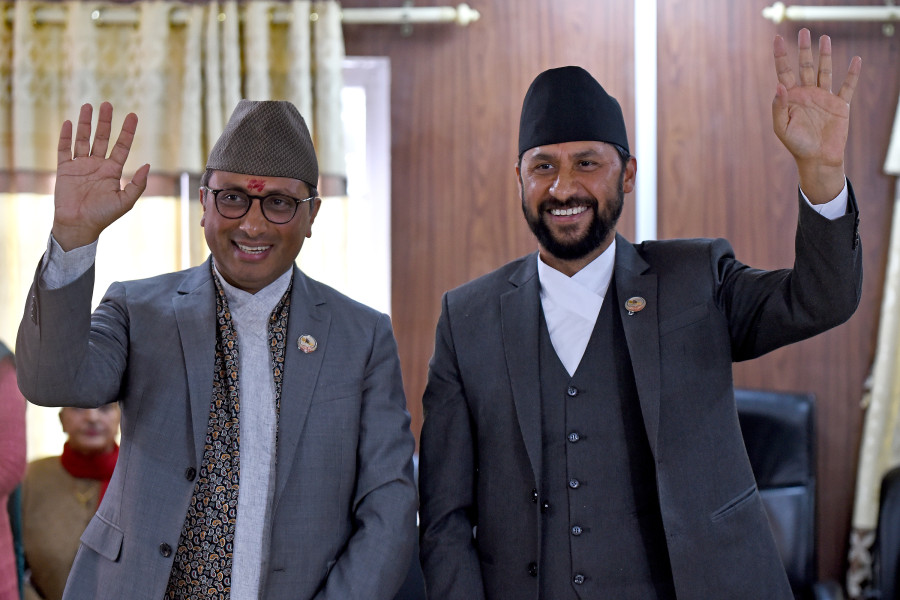Columns
Fork in the road for RSP
Can the party develop a loyal cadre base that can work for the long haul without seeking immediate personal gains?
Biswas Baral
The political crystal balls are out again. Following the resounding twin victories of Rabi Lamichhane (Chitwan-2) and Swarnim Wagle (Tanahun-1) in the April 23 bypolls, speculating about the future of their Rastriya Swatantra Party (RSP) has become the new national pastime.
Will the RSP join the federal government? Or will Lamichhane, its popular chairperson, look to build the party organisation and turn it into a formidable electoral force by the next general elections four years down the line?
The party (and the country) will be best served if it stays out of government and continuously flags its shortcomings from the opposition benches. There will be no better way to augment its already significant public support. In that case, those in government will also have to be on their toes constantly.
That seems unlikely, though. Lamichhane is itching to rejoin government and will lap up a chance to lead the Home Ministry again. Doing so will be in keeping with his exalted political ambition, as well as his desire to foreclose further inquiry into his dual passports. On the other hand, if he is out of power, the sword of legal prosecution will continue to hang over him—or so Lamichhane seems to think.
If Nepali Congress insiders are to be believed, their former colleague Swarnim Wagle is also an impatient man. Now that he has been elected to Parliament, he will be angling for a ministerial berth. Notably, there is also a sizable constituency in the RSP in favour of addressing public grievances by joining government.
Grubby business
The established parties want the RSP to govern too. They know that the best way to tarnish the image of a new party is to involve it in the grubby business of governing a corrupt country. But if the RSP stays in the opposition and strongly raises issues of public concern, its popularity will steadily grow, in which case the old parties could face an existential crisis by the next election cycle.
The RSP could join government also because it is less a political party and more a conglomeration of political newbies with bloated egos. The power-hungry members of the traditional bourgeoisie who occupy its top echelons will not desist from stabbing each other in the back to clear their way to state power. The party leadership will thus be under constant pressure to join government. But if the RSP does so, disagreements in the party will rise. Those who don’t get plum state posts will start plotting the downfall of their supposedly luckier party colleagues. They may not hesitate even to break away from the mother ship to realise their power goals.
Historically, disagreements over joining government and the accompanying failure of the party leadership to manage the leaders have been the prime reasons for ruptures in Nepali political parties—be it the Nepali Congress, the CPN-UML or the CPN (Maoist Centre). Again, the RSP, which has no ideological glue to hold it together, is particularly vulnerable on this count.
Lamichhane cannot ride the popularity wave to an executive presidency, unlike, say, Donald Trump in the United States. Nepal’s mixed electoral system and its diverse population patterns also negate the possibility of his party getting an overwhelming mandate in the national elections. Nor does Lamichhane have a potent ideology like Hindutva to lock in voters, as Narendra Modi seems to have done in India. But even Modi would not have succeeded electorally without the organisational heft of the Rashtriya Swayamsevak Sangh and the Bharatiya Janata Party to rely upon.
A more relevant point of comparison for the RSP might be CK Raut’s Janamat Party, the other new kid on the Nepali political block. As Tula Narayan Shah, an astute analyst of all things Madhesh, recently told me over a cup of steaming tea, Janamat’s chairperson CK Raut is a patient organisation-builder. Moreover, he has over the years cultivated a loyal cadre base deeply committed to the cause of Madheshi rights.
At the rate he has been quietly expanding and consolidating his organisation, Raut’s party is on course to give established parties in Madhesh a run for their money in the next general election. In a parliamentary system, there can really be no substitute for a strong grassroots-level organisation.
Comparisons aside, can’t the RSP build the party organisation while being a part of the federal government? That might be the wrong question, though. Perhaps a more pertinent one is: Can the RSP develop a loyal cadre base that can work for the long haul without seeking immediate personal returns?
Another point of comparison could be the CPN (Maoist). The Maoist movement would have failed were it not for the potent combo of the organisational skills of Pushpa Kamal Dahal and the ideological weight provided by Baburam Bhattarai. Seen in this light, Lamichhane, with his power to pull the masses, could look to build the party organisation while someone like Wagle, with his wealth of knowledge, works to give the party a solid ideological footing.
Legal troubles
Can Lamichhane, Wagle and company do so by defying common expectations?
Many “new forces” have come and gone in Nepali politics. The reason for their demise was twofold: Lack of ideological clarity and their impatience to get into government.
The RSP’s victory in the recent polls has come as a breath of fresh air as it has compelled the old parties to introspect. If the RSP continues to hold power to account, the old brigade will be forced to reform—or wilt away.
But if the party joins government, the old masters at the power game will employ every trick to bring it down.
What about Lamichhane’s legal troubles, though? Won’t they mount if he is out of government?
Whatever the merit of the legal case against Lamichhane, if the state machinery is seen as hounding him even when he is out of government, his popularity will only grow. (Trump’s recent indictment has only boosted his chances of retaking the White House in 2024.)
The choice for the RSP could not be clear enough: Either plan long-term and prosper, or wither away in the mad rush for power, just like the many “new forces” before it.




 11.12°C Kathmandu
11.12°C Kathmandu















